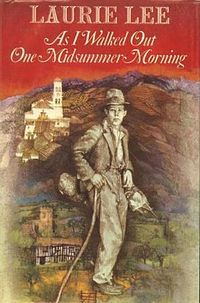As I Walked Out Into Metaphor
Jeees… metaphor.
Here’s an idea about them that does my head in: that though metaphors can be considered to be ‘in’ language we cannot conceive of language in anything other than metaphoric terms. Or: everything you read and hear is a bloody metaphor in some way. Enough of that. I also largely agree with it.
And so often I see metaphor as taking the reader away from the sensation the writer hopes to depict, from the experience s/he hopes to replicate on screen and paper, and not closer. A different thing is just a different thing, not a better description of the first thing. But it doesn’t have to be.
Here’s an example, not the best perhaps but the most recent I’ve come across, from Laurie Lee’s As I Walked Out One Midsummer Morning (1969), found in Saturday’s Guardian:
‘I walked steadily, effortlessly, hour after hour in a kind of swinging, weightless realm. I was at that age which feels neither strain nor friction, when the body burns magic fuels, so that it seems to glide in warm air, about a foot off the ground, smoothly obeying its intuitions. Even exhaustion, when it came, had a voluptuous quality, and sleep was caressive and deep, like oil.
The writing here is ‘voluptuous’ yet precise, and as such it is characteristic of Lee’s style, in which elaborate metaphors serve not as ornaments, but rather as the means of most closely evoking complex experience. Lee does not walk so much as levitate or hover, borne aloft by supernatural stamina, and, in mimicry of this sensation, his clauses, suspended by their commas, also bear the reader along ‘the way’ and onwards into the unknown.’
I agree.
That’s it. I agree. No metaphors.




